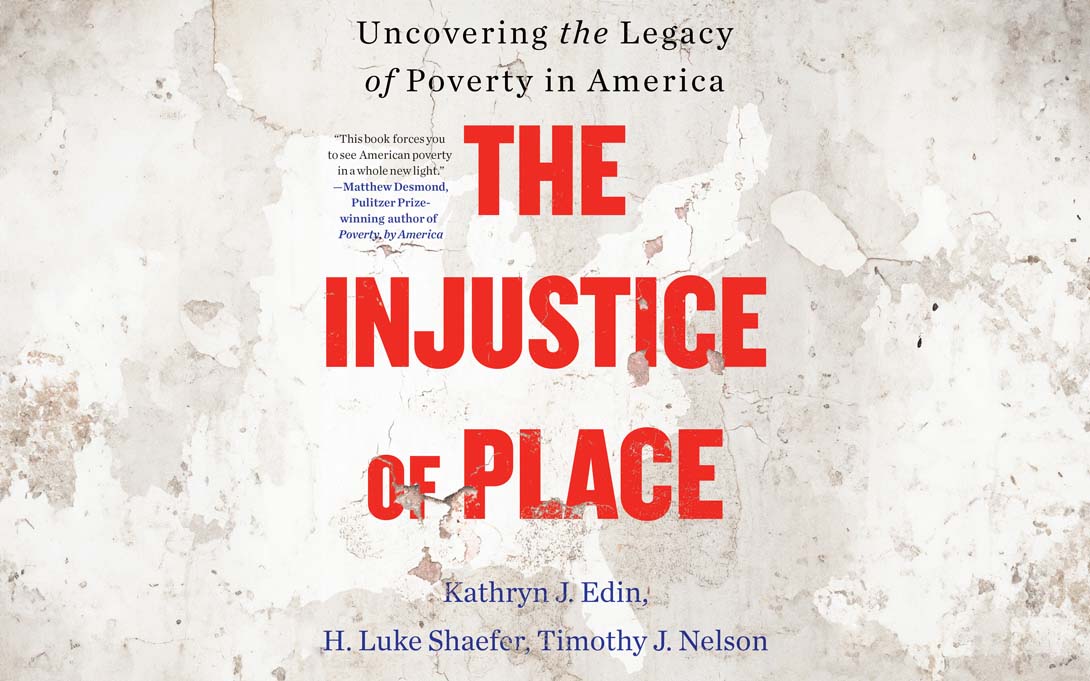
America is rife with "internal colonies," where systemic violence, resource extraction, and corruption among decision makers have contributed to generations of poverty and disadvantage. These communities suffer from environmental degradation, lack of services, and shortened life expectancy, and they are spread across a wide swath of the country: from Appalachia, to the Tobacco Belt of Virginia and the Carolinas, the Cotton Belt in the South, and South Texas.
These areas are the focus of a new book by the Ford School’s Luke Shaefer, The Injustice of Place: Uncovering the Legacy of Poverty in America, (Harper Collins, August 2023) which links economic data, health outcomes, and local history and traditions. Shaefer, the Hermann and Amalie Kohn Professor of Social Justice and Social Policy and director of Poverty Solutions, co-authored the book with Kathryn Edin, a sociology professor, and Timothy Nelson, director of undergraduate studies in sociology, both at Princeton.
Shaefer and Edin previously collaborated on $2.00 a Day: Living on Almost Nothing in America (Mariner Books, 2016), which was a New York Times Notable Book of the Year.
The places highlighted in The Injustice of Place were identified by an Index of Deep Disadvantage developed by Shaefer, Edin, and Nelson. The index represents a holistic look at disadvantage, using health indicators (life expectancy, low infant birth weight), poverty metrics (rates of poverty and deep poverty), and social mobility data (Opportunity Insights Mobility Metrics).
The researchers found most of the 100 most disadvantaged places in the country are rural, not inner cities. They have spent years immersing themselves in communities in these regions, getting to know the residents.
The communities they studied have common traits of unequal schooling, resource extraction, corruption, and bad governance.
Among the similarities the authors present:
- When disasters such as tornadoes, hurricanes, or floods strike, governmental assistance often deepens pre-existing divides, benefitting the “haves” and not the “have-nots.”
- Many people think of rural America as predominantly white — but the most disadvantaged places in the nation are rural communities of color.
- Americans living in disadvantaged communities can expect to die a decade earlier than those living in the most advantaged places.
- In many rural places with the most significant levels of disadvantage, the rate of violent crime is equal to that of large cities like Chicago.
“We are now armed with new revelations about poverty and a new understanding of how deeply disadvantage is woven into the history and present-day fabric of particular places,” they write. The book “tells the stories of America’s internal colonies – where disadvantage has been endemic for generations – and calls us to envision a different future, where no corner of the country is left behind.”
See reviews of the book:
Listed in Men’s Health 52 Upcoming Nonfiction Books in 2023, July 25, 2023
In America's "internal colonies," the poor die far younger than richer Americans, CBS News, July 27, 2023
Disparity in Life Expectancy: The Poor in America’s “Internal Colonies” Face Premature Death Compared to Richer Americans, Vigour Times, July 28, 2023
What the Best Places in America Have in Common, The Atlantic, August 5, 2023
The Injustice of Place, Outside the Beltway, August 7, 2023
A powerful, alarming portrayal of how poverty remains entrenched in unfairly forgotten places across America, Kirkus Reviews, August 8, 2023
Publishers Weekly, August 8, 2023
Rural poverty takes center stage in new book, MSNBC Morning Joe, August 11, 2023
Poverty experts find that where you grow up largely determines how you do in life, The 19th, August 11, 2023
Best history books of August, as chosen by Amazon editors, Amazon, August 17, 2023
How Poverty Is a Direct Result of Corruption, Time, August 23, 2023
The Injustice of Place: Uncovering the Legacy of Poverty in America - 5 Key Insights, Next Big Idea Club, August 27, 2023
Slate Political Gabfest, August 31, 2023 (podcast - segment begins at 32:36)
One overlooked way to fight opioid deaths? Give people something to do, Los Angeles Times, August 31, 2023
AudioFile’s Best Audiobooks of August, August 31, 2023
Crystal City and the poverty of place, Texas Public Radio, September 12, 2023
